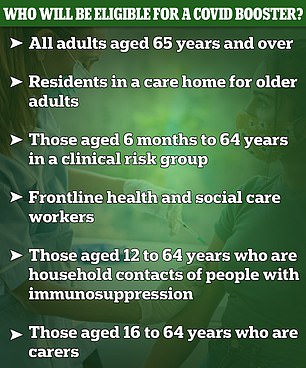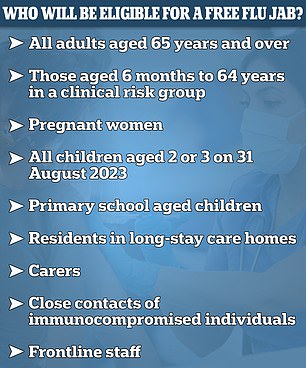I’m a doctor – these are four myths about flu jabs
The season of stuffy noses and barking coughs is almost here.
While the flu is simply unpleasant for most, it can be life-threatening for others.
But getting an annual flu shot can protect people from becoming seriously ill.
People over 65 and those with certain long-term health conditions such as diabetes, asthma and heart disease can get the jab for free on the NHS. It is also recommended if you are pregnant or if you are an informal caregiver.
Here, NHS GP and This Morning doctor Dr Sara Kayat, who works with Boots, debunks some common myths around the flu jab.
Dr Sara Kayat, who is currently in her third trimester of pregnancy, is pictured getting her flu shot at Boots. She is urging other pregnant women to get their vaccine this year
You can get the flu from the vaccine
Some believe that getting the flu shot can actually give you the flu. But doctors say this is categorically not true.
“Injected flu vaccinations contain a small amount of an inactive flu virus that cannot give you flu,” says Dr. Kayat.
Although this makes it impossible to catch the flu from a shot, a sore or slightly feverish feeling for a few days after vaccination is a common side effect caused by the immune system reacting to the vaccine.
According to the World Health Organization (WHO), serious side effects are extremely rare. One in a million people can develop Guillain-Barré syndrome, which causes muscle weakness and paralysis.
However, the flu itself can be serious. It is believed that around 14,500 people died in England last winter.
But children who were stung were 66 per cent less likely to be admitted to hospital, while those over 65 saw their risk reduced by 25 per cent and vulnerable people were a third less likely to need NHS care.
The flu vaccination will cause you a lot of pain
Like all shots, the flu vaccine can sting a little.
But most side effects are only mild and last about a day.
“You may feel slightly sore where your shot was injected,” says Dr. Kayat.


People over 65 and those with certain long-term health conditions such as diabetes, asthma and coronary heart disease can get the jab for free on the NHS
‘Other side effects include a slightly raised temperature, muscle pain or headache, but these are usually mild and only last a day or so.’
To ease the pain, the NHS suggests continuing to move your arm regularly and taking a painkiller such as paracetamol or ibuprofen.
I had the vaccination last year, I don’t need it anymore
Unlike some vaccines that last a lifetime, the flu shot must be updated every year.
“It is recommended that you get the flu vaccination annually,” says Dr. Kayat.
‘This is because the flu virus evolves and changes over time, so new vaccinations are developed every year to match the new flu strains.
“Also, your protection decreases over time.”
Every February, the WHO recommends which flu strains the vaccines should target and manufacturers get them ready by September of that year.
It is still possible to become infected with a strain of flu even after receiving the vaccine, because different flu viruses are constantly circulating and no vaccine is 100 percent effective.
Pregnant women cannot receive the vaccination
It is a myth that pregnant women cannot get a flu shot.
In fact, getting the flu shot will help protect both mother and baby.
‘Pregnant women are eligible for a flu shot at any stage of pregnancy, from the first few weeks until the expected due date.
“I encourage all pregnant women to get their flu shot this fall,” said Dr. Kayat, who is currently in her third trimester of pregnancy.
However, according to the UK Health Security Agency, only 35 percent of expectant mothers received their free flu shot last season (2021-22), compared to 38 percent the year before (2020-21).
Dr. Kayat said: ‘Pregnancy changes the way the body responds to infections. Therefore, it is believed that pregnant women like me are at increased risk of serious complications from the flu.
‘If you are pregnant, a flu shot will help protect you and some protection will also be passed on to your baby for the first few months of its life.’
Those who get a shot are less likely to become infected and develop serious illness from the flu.
Becoming infected with the flu during pregnancy increases the risk of premature delivery, with the baby having a low birth weight and stillbirth, the NHS warns.
